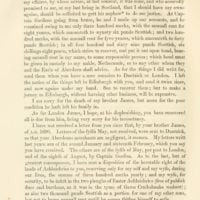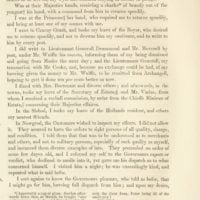![1667] DIARY OF PATRICK GORDON. 89 all the Russia merchants... 1667] DIARY OF PATRICK GORDON. 89 all the Russia merchants...](https://cdn2.picryl.com/photo/1699/12/31/1667-diary-of-patrick-gordon-89-all-the-russia-merchants-33f5db-1024.jpeg)
Related
![1667] DIARY OF PATRICK GORDON. 87 Dined by Mr. Carril his father](https://cdn2.picryl.com/thumbnail/1699/12/31/1667-diary-of-patrick-gordon-87-dined-by-mr-carril-his-father-a86887-200.jpeg)
1667] DIARY OF PATRICK GORDON. 87 Dined by Mr. Carril his father
![1666] DIARY OF PATEICK GORDON. 81 mariners aud souldlers](https://cdn2.picryl.com/thumbnail/1699/12/31/1666-diary-of-pateick-gordon-81-mariners-aud-souldlers-ea9fb7-200.jpeg)
1666] DIARY OF PATEICK GORDON. 81 mariners aud souldlers

176 DIARY OF PATRICK GORDON. [1692 just wages thrive. I think he may be summoned...
![1667] DIARY OF PATRICK GORDON. 97 storme, wee could not gett over to Embden](https://cdn2.picryl.com/thumbnail/1699/12/31/1667-diary-of-patrick-gordon-97-storme-wee-could-not-gett-over-to-embden-4fd79e-200.jpeg)
1667] DIARY OF PATRICK GORDON. 97 storme, wee could not gett over to Embden
![1667] DIARY OF PATRICK GORDON. lOl with their officers, from which 1 diswaded them, that the Emperour](https://cdn2.picryl.com/thumbnail/1699/12/31/1667-diary-of-patrick-gordon-lol-with-their-officers-from-which-1-diswaded-b66781-200.jpeg)
1667] DIARY OF PATRICK GORDON. lOl with their officers, from which 1 diswaded them, that the Emperour
![1686] DIARY OF PATRICK GORDON. 117 maides, 1 doller 1 floren 14 pence](https://cdn2.picryl.com/thumbnail/1699/12/31/1686-diary-of-patrick-gordon-117-maides-1-doller-1-floren-14-pence-70942c-200.jpeg)
1686] DIARY OF PATRICK GORDON. 117 maides, 1 doller 1 floren 14 pence

110 DIARY OF PATRICK GORDON. [1686 I gave up my petition
![1689] DIARY OF PATRICK GORDON. 165 memory, the younger Czar](https://cdn2.picryl.com/thumbnail/1699/12/31/1689-diary-of-patrick-gordon-165-memory-the-younger-czar-b525cd-200.jpeg)
1689] DIARY OF PATRICK GORDON. 165 memory, the younger Czar
![1686] DIARY OF PATRICK GORDON. 155 Crossing the Black River](https://cdn2.picryl.com/thumbnail/1699/12/31/1686-diary-of-patrick-gordon-155-crossing-the-black-river-daa006-200.jpeg)
1686] DIARY OF PATRICK GORDON. 155 Crossing the Black River
1667] DIARY OF PATRICK GORDON. 89 all the Russia merchants...
Summary
Passages from the diary of General Patrick Gordon of Auchleuchries : A.D. 1635-A.D. 1699"
1667] DIARY OF PATRICK GORDON. 89
all the Russia merchants, with ladyes and niusick, which cost ... I
gave to Mr. Cooke fvve punds sterling, to Mr. Tomkins ten shillings, to the
door keepers ten shillings.
Received a letter from Gencrall Dalyell, dated Kilniarnok, the twenty-
seventh of December. Returned an answer to his Excellency the same
evening, which I sent in the black boxe.
I went to London, and tooke my leave of ifriends there. Received
letters from ]\Iosko, from ]\Ir. Bryan, dated ]\Iosko, the fourteenth of
December, with letters from my wyfc and mother in law, to the which I
returned answer by the first post.
I went and tooke my leave of Prince Rupert, who was very sick,* and
told me he should writt to the Elector of Brandeburg, and to Duke
Bogislaus Radzivil, in favour of Collonell Bockhovcn, and send the letters
after me to Hamburg, commanding ]\lr. Hayes, his secretarv, to mind
him when he should be a litle better.
I was sent for to have my last audience of rlis Majesty, who received me J;imiaiT is.
very graciously, and delivered the letters to the Tzaar out of his owne hand
to me, desireino: to be reraembred to, and salute, his deare and loveing
brother, which promiseing to do, I then thanked His Majestic for his great
favours to me. So, being admitted to kiss His Majesties hand, I tooke leave,
and was reconducted to my lodging ; whither being come, and lookeing to
the superscription of the letter, and found Illusfri'ssimo written for Serenis-
sivio^ so I desired Sir JoJm Hebdcn to represent the business to the
Secretary of State, telling that 1 durst not for my licad carry such a letter
with me, and that it was well knowne what a great deale of stirr there had
been in j\Iosko with the Earlc of Carlisle about that Avord. Tlie Secretary
very readily promised to amend it.
The next day I was conducted to His Royall Highness the Duke of
Yorke, avIio, with much favour, received me and dismissed me. I told liis
Highness that His Majesty had promised that I should have a catchf to waft
me over to Flanders, and His Highness said that he would give orders to
Sir William Coventry | about it.
I went and tooke my leave of my Lord Chanccllour, who was still sick
* [He was trepanned about a fortni^lit after- t [Catch, katcli, or ketch, a fast-sailing
wards. One of the physicians in attendance ship ]
on the occasion was a countryman of our t [Then secretary to the Duke of York tb«
journalist, Sir Alexander Fraser of Durris.] Lord High Admiral.] '
Gordon was brought up and remained a lifelong Roman Catholic, at a time when the Church was being persecuted in Scotland. At age of fifteen, he entered the Jesuit college at Braunsberg, East Prussia, then part of Poland. In 1661, after many years experiences as a soldier of fortune, he joined the Russian army under Tsar Aleksei I, and in 1665 was sent on a special mission to England. After his return, he distinguished himself in several wars against the Turks and Tatars in southern Russia. In recognition of his service he was promoted to major-general in 1678, was appointed to the high command at Kiev in 1679, and in 1683 was made lieutenant-general. In 1687 and 1689 he took part in expeditions against the Tatars in the Crimea, being made a full general. Later in 1689, a revolution broke out in Moscow, and with the troops under his command, Gordon virtually decided events in favor of Peter the Great against the Regent, Tsarevna Sophia Alekseyevna. Consequently, he was for the remainder of his life in high favor with the Tsar, who confided to him the command of his capital during his absence from Russia. In 1696, Gordon's design of a "moveable rampart" played a key role in helping the Russians take Azov. One of Gordon's convinced the Tsars to establish the first Roman Catholic church and school in Muscovy, of which he remained the main benefactor and headed the Catholic community in Russia until his death. For his services his second son James, brigadier of the Russian army, was created Count of the Holy Roman Empire in 1701. At the end of his life the Tsar, who had visited Gordon frequently during his illness, was with him when he died, and with his own hands closed his eyes. General Gordon left behind him a uniquely detailed diary of his life and times, written in English. This is preserved in manuscript in the Russian State Military Archive in Moscow. Passages from the Diary of General Patrick Gordon of Auchleuchries (1635–1699) was printed, under the editorship of Joseph Robertson, for the Spalding Club, at Aberdeen, Scotland, 1859.
